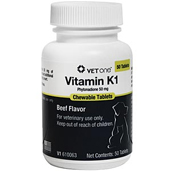Most of your dog's nutritional needs
should be met by the food that he eats. To determine whether or
not your dog's food is adequate, start by looking on the label for
a statement by the Association of American Feed Control Officials (AAFCO)
saying that the food conforms to accepted nutrient profiles or has undergone
an animal feeding test and is nutritionally complete. Diets that
do not meet AAFCO standards are readily available. Make sure that
the food you buy is not one of them.
"The good news is that if you feed a high-quality, commercially available dog food, your dog should be getting appropriate levels of vitamins and minerals in his diet."
If your dog is healthy and eats an
AAFCO approved food well, he is receiving at least the minimum amount
of nutrition needed to keep him healthy. If he is thriving on
his current diet, there is probably no reason to make a change.
However, there are at least a few instances when giving additional vitamins,
minerals and other nutritional supplements might be beneficial.
Dog Vitamins and Minerals

Vitamins and minerals are important
nutrients for dogs. They play a myriad of roles in the body, and
either too much or too little of even a single vitamin or mineral can
bring about significant illness. The good news is that if you
feed a high-quality, commercially available dog food, your dog should
be getting appropriate levels of vitamins and minerals in his diet.
However, if your dog fits into any
of the following categories, giving him a multivitamin and mineral supplement is probably in order.
- He is an extremely picky
eater.
- He will only eat poor quality
pet food.
- You feed a home-prepared
diet.
- He has an illness or lifestyle
that changes his nutritional requirements.
Your veterinarian can help you determine
whether vitamin and mineral supplementation is necessary, and if so,
what product might be best for your dog.
Other Nutritional Supplements for Dogs
We all know that good nutrition is
essential to maintaining health. Therefore, it should not be too
surprising that increasing the amount of certain foods or components
of food in a dog's diet could treat or prevent some types of disease.
Nutritional supplements can assist with:
Most pet meds are very safe
and some have undergone vigorous testing to ensure that they actually
do benefit dogs suffering from the conditions that they claim to treat.
However, any substance strong enough to treat a disease is also strong
enough to have side-effects or to interact with other medications that
your dog might be taking. It is always safest to check with your
veterinarian before giving your dog something new, and this includes
if you are thinking of starting him on a nutritional supplement.
The above is provided for information purposes only and should not be used for the diagnosis or treatment of any condition.
This information does not cover all possible variables, conditions, reactions, or risks relating to any topic, medication, or product and should not
be considered complete. Certain products or medications may have risks and you should always consult your local veterinarian concerning the treatment of
your pet. Any trademarks are the property of their respective owners.